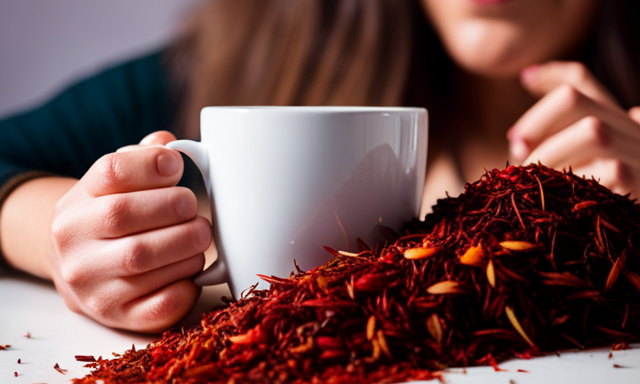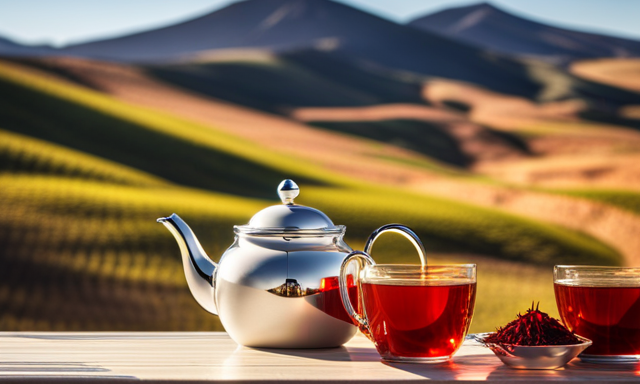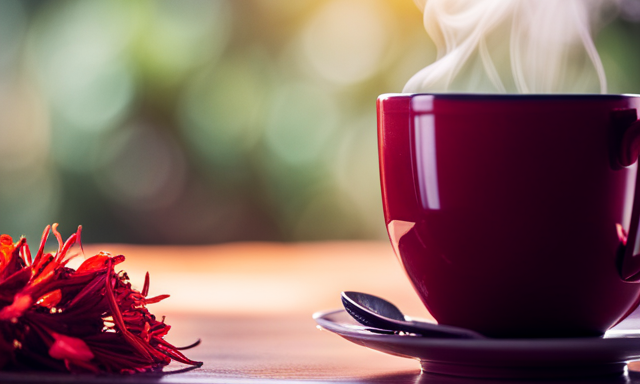During my pregnancy, I found myself craving a hot, comforting drink to help me relax and unwind. One option that caught my attention was rooibos tea. But as an expectant mother, I wanted to make sure that this beverage was safe for me and my baby.
After conducting thorough research and consulting with experts, I discovered some interesting findings about rooibos tea and its effects during pregnancy. In this article, I will delve into the nutritional benefits of rooibos tea, its caffeine content, and the opinions of experts in the field.
Additionally, I will provide recommendations for safe consumption and alternative herbal teas that are suitable for pregnancy. By the end, you will be equipped with the knowledge to make an informed decision about whether or not to indulge in a cup of rooibos tea during your pregnancy journey.
Key Takeaways
- Rooibos tea is a herbal tea that can be considered safe during pregnancy.
- It does not contain caffeine, making it a suitable choice for pregnant women.
- Rooibos tea is known for its potential benefits such as providing antioxidants and promoting relaxation.
- However, it is important to consult with a healthcare provider for personalized guidance and to ensure its safety and efficacy during pregnancy.
What is Rooibos Tea?
You’ll love sipping on rooibos tea, a delicious and caffeine-free herbal beverage known for its rich flavor and numerous health benefits.
Rooibos tea, also known as red bush tea, is native to South Africa and has been enjoyed for centuries due to its potential health benefits.
This tea is packed with antioxidants, which can help protect your body against damage from harmful free radicals. It may also have anti-inflammatory properties and can potentially support heart health.
Brewing methods for rooibos tea vary, but the most common method is to steep the tea leaves in boiling water for about 5-7 minutes. This allows the full flavor and potential health benefits to be extracted from the leaves.
As we explore the nutritional benefits of rooibos tea, you’ll discover even more reasons to incorporate this delightful beverage into your daily routine.
Nutritional Benefits of Rooibos Tea
Indulging in a warm cup of this crimson brew can provide you with a plethora of nutritional benefits during pregnancy. Rooibos tea is rich in antioxidants, which can help boost your immune system and protect against oxidative stress. It also contains essential minerals like calcium, magnesium, and potassium, which are important for the development of your baby’s bones and muscles.
Additionally, rooibos tea is caffeine-free, making it a great alternative to other caffeinated beverages during pregnancy. However, it’s important to note that there is limited research on the safety of rooibos tea during pregnancy, so it’s always best to consult with your healthcare provider before adding it to your diet.
Transitioning into the subsequent section about the safety of rooibos tea during pregnancy, it’s important to consider any potential risks.
Safety of Rooibos Tea During Pregnancy
When it comes to the safety of enjoying a warm cup of rooibos tea during pregnancy, it’s crucial to be aware of any potential risks. While rooibos tea is generally considered safe and even beneficial for pregnant women, it is always wise to consult with your healthcare provider before adding it to your diet. Some studies suggest that rooibos tea may have potential benefits during pregnancy, such as its antioxidant properties and its ability to relieve common pregnancy symptoms like heartburn and constipation. However, there is limited research on the effects of rooibos tea specifically during pregnancy, so it’s important to exercise caution. To help you make an informed decision, here is a table highlighting the potential risks and benefits of rooibos tea during pregnancy:
| Potential Risks | Potential Benefits |
|---|---|
| None reported | Antioxidant properties |
| Relieves heartburn and constipation |
With this information in mind, it’s time to explore the caffeine content in rooibos tea.
Caffeine Content in Rooibos Tea
While enjoying a warm cup of rooibos tea, it’s important to note that there is no caffeine content in this beverage. This makes it a safe choice for pregnant women who want to indulge in a soothing drink without worrying about caffeine levels.
With no caffeine in rooibos tea, potential risks such as increased heart rate, high blood pressure, or interference with sleep patterns are eliminated. This is particularly beneficial during pregnancy when it’s recommended to limit caffeine intake.
Instead of relying on caffeine, rooibos tea offers a natural and caffeine-free alternative, allowing pregnant women to enjoy a warm and comforting beverage without any potential negative effects.
Moving forward, let’s explore the antioxidant properties of rooibos tea.
Antioxidant Properties of Rooibos Tea
Immerse yourself in the world of rooibos tea and discover its powerful antioxidant properties. Rooibos tea is packed with antioxidants, such as aspalathin and nothofagin, which help to neutralize harmful free radicals in the body. These antioxidants have been shown to have a range of health benefits, including reducing inflammation and protecting against chronic diseases like heart disease and cancer.
While rooibos tea is generally considered safe to consume during pregnancy, it’s important to note that there is limited research on its potential effects on pregnancy. Therefore, it’s recommended to consume rooibos tea in moderation and consult with your healthcare provider regarding any potential health risks.
It’s also worth noting that rooibos tea does not contain caffeine, making it a suitable alternative for pregnant women who want to avoid caffeine.
In the next section, we’ll explore the potential effects of rooibos tea on pregnancy and discuss any associated risks.
Potential Effects on Pregnancy
During pregnancy, rooibos tea may have potential effects on the health of both the mother and the baby. While there aren’t specific studies on the effects of rooibos tea during pregnancy, it’s generally considered safe to consume in moderation.
Rooibos tea is known for its high content of antioxidants, which can help protect cells from damage caused by free radicals. These antioxidants may provide potential benefits during pregnancy by supporting the immune system and reducing inflammation. However, it’s important to note that rooibos tea also contains compounds that may interfere with certain medications and hormone levels.
Therefore, it’s advisable to consult with a healthcare provider before consuming rooibos tea during pregnancy. Moving forward, it’s important to consider expert opinions on rooibos tea during pregnancy to make an informed decision.
Expert Opinions on Rooibos Tea During Pregnancy
Contrary to popular belief, experts have varying opinions on the safety of consuming rooibos tea during pregnancy. While some studies suggest that rooibos tea may have potential risks for pregnant women, others argue that it can be safely consumed in moderation.
Medical studies have shown that rooibos tea contains high levels of antioxidants, which can benefit overall health. However, there is limited research specifically on its effects during pregnancy. Some experts express concerns about the potential impact of rooibos tea on hormone levels and the development of the fetus, while others believe that the benefits outweigh the risks.
It is important for pregnant women to consult with their healthcare provider for personalized advice. Transitioning into the subsequent section about ‘recommendations for safe consumption,’ it is crucial to consider expert guidance for a healthy and enjoyable pregnancy.
Recommendations for Safe Consumption
To ensure a healthy and enjoyable pregnancy, it’s essential to follow expert recommendations for safely enjoying the benefits of rooibos tea. When it comes to pregnancy health, herbal teas can be a great option, but it’s important to choose wisely.
Rooibos tea is generally considered safe during pregnancy and can provide a range of benefits such as being rich in antioxidants and caffeine-free. However, it’s crucial to consume it in moderation and consult with your healthcare provider before making it a regular part of your routine.
It’s also important to note that some herbal teas may not be safe during pregnancy, so it’s always best to err on the side of caution and seek professional advice.
Transitioning to the next section on alternative herbal teas for pregnancy, it’s important to explore other options that are safe and beneficial for expectant mothers.
Alternative Herbal Teas for Pregnancy
When exploring other options for herbal teas during pregnancy, consider trying out some alternative blends that can provide a variety of benefits for expectant moms.
For morning sickness, ginger tea can be a soothing choice. It’s been shown to help reduce nausea and vomiting during pregnancy.
Peppermint tea is another option that may ease digestive discomfort and alleviate morning sickness symptoms.
Additionally, chamomile tea can help promote relaxation and reduce anxiety, which can be beneficial for pregnant women.
After giving birth, herbal teas can also aid in postpartum recovery. Red raspberry leaf tea is often recommended as it may help tone the uterus, support postpartum healing, and aid in milk production.
Nettle tea is another option that can provide essential nutrients like iron and calcium, which are important for recovery and breastfeeding.
These alternative herbal teas can offer potential benefits for pregnant women. Transitioning into the next section, it’s important to weigh the pros and cons of different options to make an informed decision.
Conclusion: Making an Informed Decision
In conclusion, it’s important to consider all the information provided to make an informed decision about which herbal teas may be beneficial for your pregnancy journey.
When it comes to choosing alternative herbal teas, it’s crucial to weigh the potential risks and benefits. Here are four key points to keep in mind:
-
Consult with your healthcare provider: They can provide personalized guidance based on your specific health needs and medical history.
-
Research the herbs: Look for scientific evidence on the safety and efficacy of the herbs included in the tea you’re considering.
-
Consider caffeine content: Some herbal teas may contain caffeine, which should be limited during pregnancy.
-
Monitor for allergic reactions: Pay attention to any adverse reactions, such as rashes or difficulty breathing, and seek medical attention if needed.
By making informed decisions and considering these factors, you can choose herbal teas that are safe and potentially beneficial during pregnancy.
Frequently Asked Questions
Can drinking rooibos tea during pregnancy help with morning sickness?
Drinking herbal teas like rooibos during pregnancy may provide natural relief for morning sickness. These teas have been shown to have beneficial properties for expectant mothers, making them a safe and healthy option.
Does rooibos tea have any potential side effects during pregnancy?
Rooibos tea has no known potential risks during pregnancy. However, it’s always best to consult with a healthcare provider. If concerned, alternative caffeine-free herbal teas like chamomile or ginger can be considered.
Are there any restrictions on the amount of rooibos tea that can be consumed during pregnancy?
During pregnancy, it’s important to maintain a balanced intake of fluids. Rooibos tea can be a beneficial choice, with its hydrating properties and absence of caffeine. The recommended daily intake is 1-2 cups, providing antioxidants and potential benefits for pregnant women.
Can rooibos tea be consumed in combination with other herbal teas during pregnancy?
Rooibos tea can be safely consumed during pregnancy. It has no caffeine and is rich in antioxidants, making it a healthy choice. However, it’s important to consult with a healthcare provider to ensure it doesn’t interact with any other herbal teas or medications.
Is it safe to consume rooibos tea throughout the entire duration of pregnancy?
Is it safe to drink rooibos tea throughout pregnancy? Yes, it is safe and even beneficial. Rooibos tea provides antioxidants, helps with digestion, and promotes relaxation. The recommended daily intake is 2-3 cups.
Conclusion
As I reflect on the safety of drinking rooibos tea during pregnancy, I’m reminded of a beautiful garden. In this garden, each plant represents a different herbal tea option for expectant mothers. Among them, rooibos stands tall, offering a safe and nutritious choice.
Expert opinions and scientific evidence highlight its benefits, from its caffeine-free nature to its rich antioxidants. So, dear readers, as you traverse the garden of herbal teas, let rooibos be your trusted companion, ensuring a healthy and enjoyable pregnancy journey.










